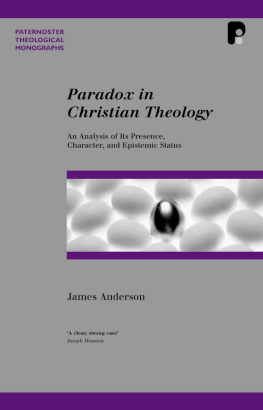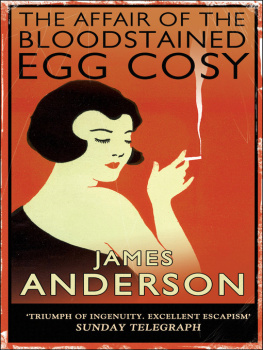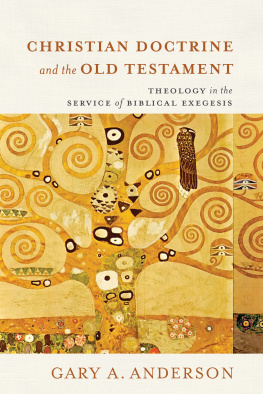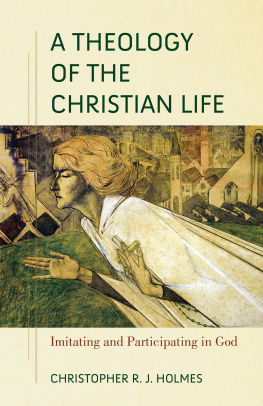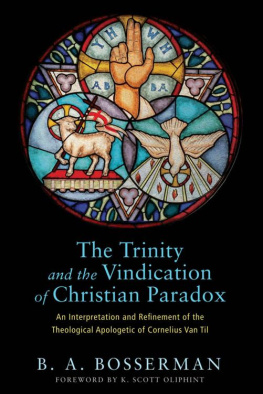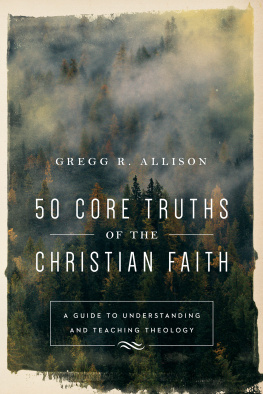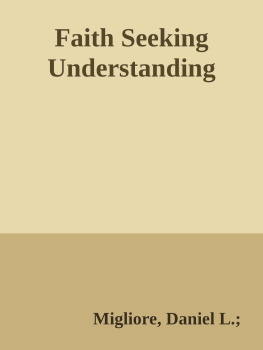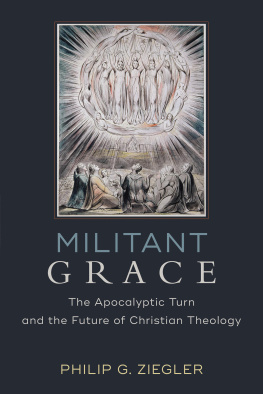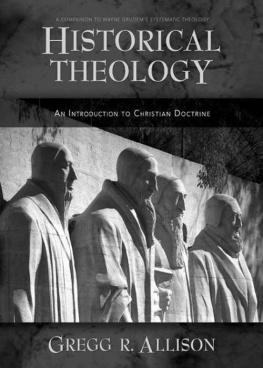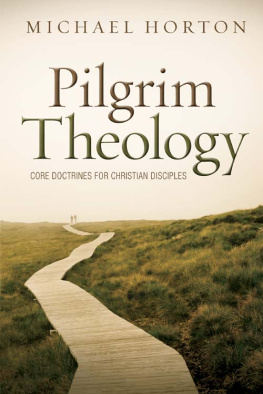
PATERNOSTER THEOLOGICAL MONOGRAPHS
A complete listing of all titles in this series
and Paternoster Biblical Monographs
appears at the close of this book

Copyright James Anderson 2007
First published 2007 by Paternoster
Paternoster is an imprint of Authentic Media
9 Holdom Avenue, Bletchley, Milton Keynes, MK1 1QR, UK
and
PO Box 1047, Waynesboro, GA 30830-2047, USA
13 12 11 10 09 08 07 7 6 5 4 3 2 1
The right of James Anderson to be identified as the Author of this Work has been asserted by him in accordance with the Copyright, Designs and Patents Act 1988
All rights reserved. No part of this publication may be reproduced, stored in a retrieval system, or transmitted in any form or by any means, electric, mechanical, photocopying, recording or otherwise, without the prior permission of the publisher or a licence permitting restricted copying. In the UK such licences are issued by the Copyright Licencing Agency, 90 Tottenham Court Road, London W1P 9HE.
British Library Cataloguing in Publication Data
A catalogue record for this book is available from the British Library.
ISBN 978-1-84227-462-0
Unless otherwise stated, Scripture quotations are taken from the
HOLY BIBLE, NEW INTERNATIONAL VERSION
Copyright 1973, 1978, 1984 by the International Bible Society.
Used by permission of Hodder and Stoughton Limited. All rights reserved.
NIV is a registered trademark of the International Bible Society
UK trademark number 1448790
Typeset by James Anderson
and printed and bound in Great Britain by
Nottingham AlphaGraphics
PATERNOSTER THEOLOGICAL MONOGRAPHS
Series Preface
In the West the churches may be declining, but theologyserious, academic (mostly doctoral level) and mainstream orthodox in evaluative commitmentshows no sign of withering on the vine. This series of Paternoster Theological Monographs extends the expertise of the Press especially to first-time authors whose work stands broadly within the parameters created by fidelity to Scripture and has satisfied the critical scrutiny of respected assessors in the academy. Such theology may come in several distinct intellectual disciplineshistorical, dogmatic, pastoral, apologetic, missional, aesthetic and no doubt others also. The series will be particularly hospitable to promising constructive theology within an evangelical frame, for it is of this that the church's need seems to be greatest. Quality writing will be published across the confessionsAnabaptist, Episcopalian, Reformed, Arminian and Orthodoxacross the agespatristic, medieval, reformation, modern and counter-modernand across the continents. The aim of the series is theology written in the twofold conviction that the church needs theology and theology needs the church which in reality means theology done for the glory of God.
Series Editors
David F. Wright, Emeritus Professor of Patristic and Reformed Christianity, University of Edinburgh, Scotland, UK
Trevor A. Hart, Head of School and Principal of St Mary's College School of Divinity, University of St Andrews, Scotland, UK
Anthony N.S. Lane, Professor of Historical Theology and Director of Research, London School of Theology, UK
Anthony C. Thiselton, Emeritus Professor of Christian Theology, University of Nottingham, Research Professor in Christian Theology, University College Chester, and Canon Theologian of Leicester Cathedral and Southwell Minster, UK
Kevin J. Vanhoozer, Research Professor of Systematic Theology, Trinity Evangelical Divinity School, Deerfield, Illinois, USA
To Catriona
Contents
The author wishes to thank Cambridge University Press for permission to reproduce and expand on parts of his previously published article, In Defence of Mystery: A Reply to Dale Tuggy, Religious Studies 41.2 (2005).
ANF | Alexander Roberts and James Donaldson (eds), The Ante-Nicene Fathers (10 vols; Edinburgh, 1867) |
CD | Karl Barth, Church Dogmatics (14 vols; eds Thomas F. Torrance and G. W. Bromiley; Edinburgh: T. & T. Clark, 1936-1977) |
HCC | Philip Schaff, History of the Christian Church (8 vols; New York: Charles Scribner, 1910) |
NPNF1 | Philip Schaff (ed.), The Nicene and Post-Nicene Fathers: Series I (14 vols; New York, 1886) |
NPNF2 | Philip Schaff and Henry Wace (eds), The Nicene and Post-Nicene Fathers: Series II (14 vols; New York, 1890) |
ST | Thomas Aquinas, The Summa Theologica of St. Thomas Aquinas (trans. Fathers of the Dominican Province; 22 vols; London: R. & T. Washbourne, 2nd edn, 1911-1920) |
One should not think slightingly of the paradoxical; for the paradox is the source of the thinkers passion, and the thinker without a paradox is like a lover without feeling: a paltry mediocrity.
Credo quia absurdumas Tertullian probably never said. Still, the sentiment behind the misquotation is a provocative one: that the Christian faith is absurd, because it asserts the impossible event of a divine death, yet this very assertion functions as a reason for belief rather than against. Few have been so bold as to champion such a counterintuitive stance, but a somewhat weaker contention has proven far more popular, namely, that certain tenets of the Christian faith are paradoxical yet may be reasonably believed in spite of this feature (if not because of it). It is this view that forms the subject of the present book.
The notion that traditional Christian conceptions of God and his relation to the world suffer from internal logical difficulties has a long history, having enjoyed currency among thinkers at every point on the scale of theological belief and unbelief. These alleged logical conflicts have been denoted in various ways, from the negatively connotative incoherence, self-contradiction, and absurdity, to the more forgiving labels of paradox, antinomy, and mystery. Terminological differences aside, the significance of these difficulties lies in the potential implications for the epistemic status of Christian beliefs. On the one hand, atheists and agnostics have marshalled such considerations in support of their stance of non-belief or outright disbelief. This strategy is typified by Michael Martin, who argues that incoherences in the very idea of God, given the standard
Beyond these conceptual difficulties with generic theism, distinctively Christian claims have also come under fire. Alleged internal contradictions in the doctrines of the Trinity and the Incarnation are regularly cited as grounds for believing that Christianity, in its traditional forms, cannot be true. Hepburn chides those theologians of paradox who refuse to take seriously the complaints of analytical philosophers, arguing that such scholars are obligated to provide excellent justification for their religious beliefs and claims, given their paradoxicality.
Within the Christian camp, on the other hand, attitudes toward theological paradox have ranged from abomination to near adoration. The conservative Calvinist philosopher Gordon Clark warns that dependence on paradox destroys both revelation
Next page
